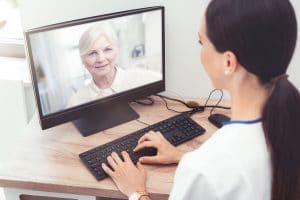COVID-19 changes in training lead to access improvement

In late March, the Association of Psychology Postdoctoral and Internship Centers (APPIC) decided to revise what counts toward clinical psychology graduate student training hours, in response to the COVID-19 pandemic.
The APPIC change now allows students to include telehealth services, which includes therapy and assessment via video or phone, in their log of hours. Given that it is recommended that students complete approximately 800 hours of clinical activities before applying for internship, this is an important and positive change for psychology graduate students and the population as whole. Here’s why.
First, clear guidelines are now provided for which specific modalities of clinical activities count toward students’ training hours—specifically clinical activities conducted by phone and video chat. Previously, it was unclear if any form of telehealth could be counted as training hours, even though telehealth has existed for many years and has strong evidence behind it.
Now, in addition to specifying what types of clinical activities count, APPIC also clearly states which kinds of clinical activities do not count toward training hours (i.e., text-based chat), leaving no room for doubt.
Secondly, students can gain valuable experiences providing psychological services in a variety of formats. In the past, students were restricted to providing therapy in-person, given the uncertainty of what modalities were permitted. With this change in guidance from APPIC, students are more likely to get experience in a variety of different formats. This is especially true right now as many students are solely using these methods to deliver therapy during the COVID-19 pandemic.
As a result, students are learning key skills, such as how to bill for telehealth sessions, how to securely store their notes, and which service providers for doing telehealth are appropriately secure.
Student therapists are also learning to choose the most appropriate modality for each clinical activity and for each client, as well as learning important non-verbal communication strategies for telehealth.
Thirdly, patients will have more options for accessing psychological services, which is especially important for the 14 million U.S. adults living in medically underserved areas.
Before COVID-19 , few training clinics offered telehealth services. Now, many training clinics are transitioning all clients to telehealth, in order to provide continuity of care.
However, 10 percent of U.S. adults, roughly 33 million people, do not use the internet, and around 27 percent of adults do not have a broadband internet connection at home. Although smartphones do somewhat fill the gap in internet access, patients may be reluctant to use their data plans for a 50-minute long video conference. For these clients, phone calls may be the best telehealth option.
Encouraging both phone and video-based clinical activities to be provided by trainees will increase access to psychological services for populations who typically have reduced access (e.g., individuals who identify in racial/ethnic minority groups, rural populations, individuals without transportation or childcare) as well as highly mobile populations (e.g., active duty military personnel, young adults).
Some may say, nothing can replace a face-to-face connection for clinical activities. However, research has shown that therapy via telehealth is as effective as therapy delivered in person. A systematic review of 16 studies examining the therapeutic alliance in video-based clinical activities found that, in 14 of these studies, both patients and providers perceived a strong therapeutic alliance similar to in-person therapy sessions.
Video-based therapy has been shown to be just as effective for treating anxiety disorders as in-person treatment. Others have even found that telephone-based clinical activities can lead to a reduction in symptoms of depression.
Furthermore, in-person psychological services are just not an option for many individuals, even when there isn’t a pandemic; it is essential that we adapt to the needs of the population and the available modalities.
The COVID-19 pandemic will likely change our lives permanently. When we resume in-person interactions, we will have the opportunity to either keep each of the changes we have made or discard them.
Providing psychological services through telehealth is one of the changes we should keep. This change will give students the opportunity to gain experience doing therapy in a variety of formats, so that they are prepared for a future of providing clinical services to those who need them regardless of the clients’ ability to receive in-person services.
Most importantly, encouraging trainees to provide telehealth services will expand access for the medically underserved populations across the United States.
Tori L. Horn, M. A., is a clinical psychology doctoral student at the University of Memphis.
Rebecca A. Krukowski, Ph.D., is an associate professor at the University of Tennessee Health Science Center
